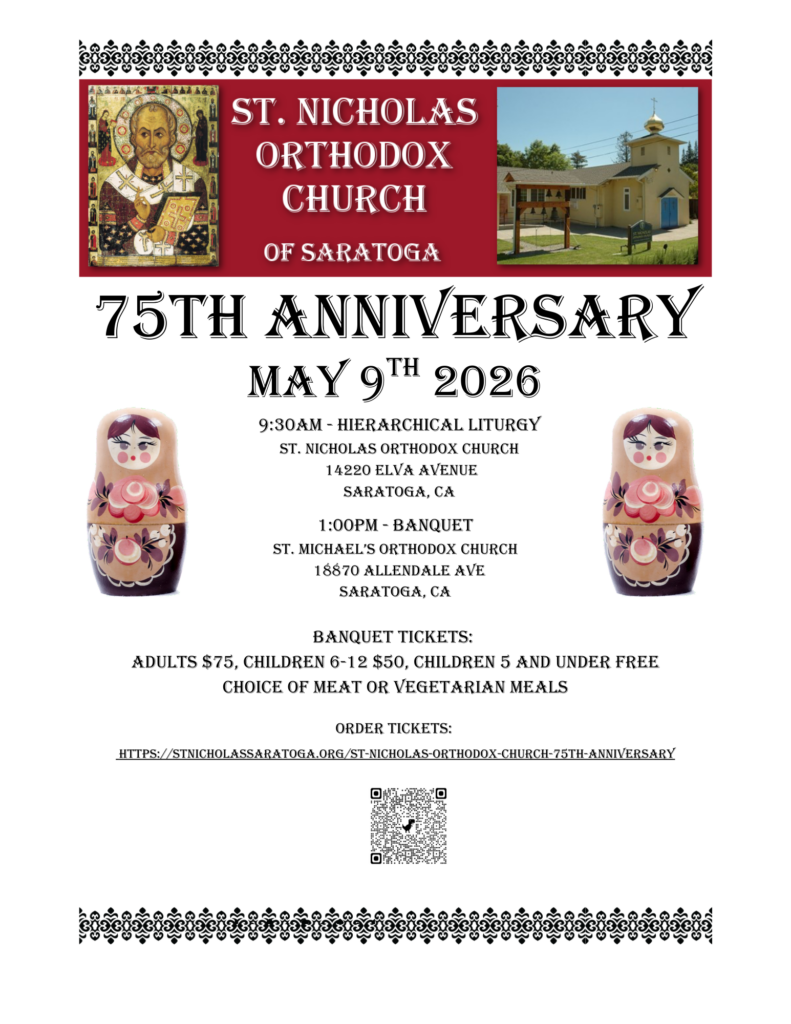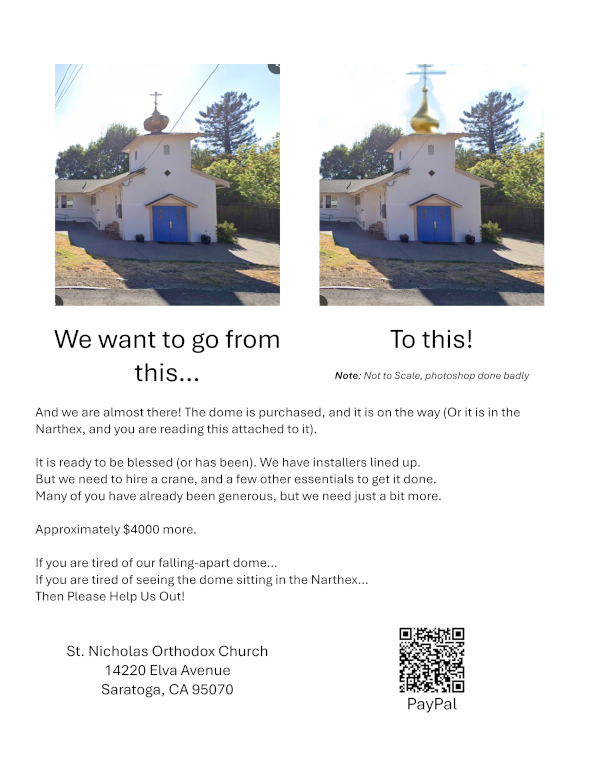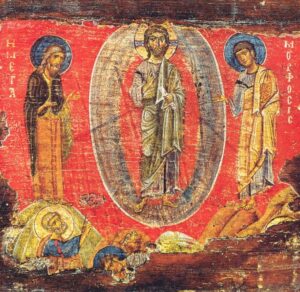
The St. Nicholas 75th Anniversary!
Get your banquet tickets now:
https://stnicholassaratoga.org/st-nicholas-orthodox-church-75th-anniversary

Focus on the Faith
Govenie: The Path of a Virtuous Life
From chapter 32 of “The Spiritual Life and How to be Attuned to it” by St. Theophan the Recluse.
(Govenie: the whole of spiritual disciplines in deepening the spiritual life and especially preparing for Holy Communion at the beginning of Lent.)
Glory be to Thee, O Lord! The fast has drawn near. You have brought me pleasure by saying that you intend to begin fasting and attending Divine Services immediately. Do not change your intention. People usually fast and attend services during Holy Week, but do not put it off until then yourself. Those who fast and attend services during Holy Week include people who have already fasted, attended services and taken Communion during the preceding weeks who desire to take Communion a second time; those who are compelled by some sort of necessity; or those for whom it is desirable to hasten the end ofthe labor of the fast, for there are only three days to labor. We will apply only the first case to you.
Lord give the blessing for you to perform govenie in a fitting manner. Each faster must do everything that you intend to do. Fast, go to church, seclude yourself, read, think and study yourself; all of this is necessary. But all of these actions must be directed toward one goal: worthy Communion of the holy Mysteries of Christ. In order to commune worthily, the soul must be cleansed with repentance. All the various actions of govenie—going to church, prayer at home, fasting, and everything else, are undertaken in order to accomplish the repentance as it should be, with sincere contrition and a firm resolution to not offend the Lord anymore.
The first thing to do in making repentance is to go inside yourself. Earthly matters and cares and unrestrained wandering of thoughts all over the place do not allow us to go inside ourselves and to study ourselves. Therefore the faster, to the extent possible during the time of the fast, shuts off his cares, and instead of going about his usual business, stays at home. This cutting off of cares is a matter of extreme importance in govenie. He who does not do so will certainly spend the fast haphazardly. You, too, must cut off your cares. No matter how few these cares are, they do exist and distract us. Set about govenie having laid aside all cares.
Let us suppose that you have cast everything aside and have gone to your room. What is there to do? It is possible to sit around in private, doing nothing. You must take up occupations that are conducive to govenie. What kind of occupations? Prayer, reading, meditation.
Prayer is that which is in addition to prayer in church. That is already self-evident. You know how to pray in church, of course. However, do take it into consideration! Go to church willingly, as to the house of God, your own home; go there without being contemptuous or bored. Go to church not just to be at the service, but in order to pray from your heart. Pray with sincere warmth, with an outpouring before God, with feelings of contrition, humility and reverential fear and with diligent petitions for your vital spiritual needs. To succeed at this, you have to think it out ahead of time, and, having come to church, you must force yourself to it. Do not just consider attendance at the service to be useless; during the course of the service the heart is warmed and calls out warmly to God. That is the main thing. You must also listen to the service, and align your thoughts and feelings with it. Variation, as long as it is directed toward one goal and is not distracting, will maintain the attention’s nourishing and constructive exertion in an agreeable manner. Attend to what is being sung and read, especially during the petitions, for they are the summary of all of the needs for which we turn to God unashamedly.
Usually, however, the thoughts do stray. This is from a lack of prayerful feeling. However, you may deal with straying thoughts in this way: As soon as you notice your thoughts have left church, turn them back and do not ever allow yourself consciously to daydream or to stray in thought during govenie,or at any other time. When the thoughts stray unbeknownst to you, this is also a small sin; but when you begin wandering offin thought purposely while you are in church, this is a sin. The Lord is among those who are in church. He who does not think about the Lord in church, but who daydreams instead, is like a man who has gone to the king in order to ask him for something, who then begins to make faces and fidget in the king’s presence, without paying any attention to him. Perhaps you will not be completely successful in preventing the straying of thoughts while maintaining your effort; but it is possible and it is necessary to not allow yourself to daydream intentionally. With respect to the straying of thoughts there are these two rules:
1) As soon as you notice this straying, turn the thoughts back, and
2) do not consciously allow the thoughts to wander.
A remedy against the straying of thoughts is mental attention, attention to the fact that the Lord is before us and we are before Him. One must place the entire mind in this though tand not deviate from it. The attention is attached to the Lordby the fear of God and by the desire to please God. From these come warmth of the heart, which draws the attention to the One Lord. Work at stirring the heart, and you will see for yourself how it keeps the thought in check. It is necessary to force yourself. Without labor and mental effort, you will notattain anything spiritual. Prostrations help a lot in the warming of the heart. Do these a little more often, performing both bowsfrom the waist and full prostrations to the ground. May the Lord grant that you feel delight in being at churchso that you will rush to it, just as people rush into a warm roomfrom the cold. During the fast, the primary stimulator of action, the reason for which we perform govenie, is worthy attendance at church. Other actions aid and assist this, but they will be discussed another time.
Some Interactive Opportunities!
The Sts. Theophan and Ignatius Study Group
We have had a study group before, but it is difficult to proceed through a book sequentially when our schedules get interrupted or are overly busy, and to keep the group in sync. Some of you expressed interest in participating but found the approach too much of a commitment.
I was involved in another Orthodox book club that solved this problem. The approach is to use an online text chat forum, where one can read and respond at one’s convenience, without everyone having to be on the same schedule. Then we can have a “live” meeting every couple of weeks for a more focused discussion, which will be helpful but optional. Occasional in-person meetings can also be had as desired.
If you would like to participate or even lurk, feel free to join the Discord. I will assign readings in the “announcement” channel, along with questions to ponder. I have also created a channel for each book or set of readings, so that comments and discussion can be focused on each reading. It is helpful to keep a journal as you read, writing down useful points from the readings and ideas for applying them to your life.
The main page for the study group is here:
https://stnicholassaratoga.org/sts-theophan-and-ignatius-study-group/
The Discord channel is where discussions take place, live meetings are held, handouts are distributed, and readings are assigned. You can sign in to that here:
https://discord.gg/TwnVnnwKcB
(Note: this Discord is separate from the St. Nicholas online members’ forum - no pledge form required).
St. Nicholas Member’s Forum
For those of you who submitted a pledge form, you are invited to participate in the St. Nicholas Members’ Forum. This includes discussion areas such as:
- announcements
- resources
- general discussion
- 75th anniversary (and other fundraiser) planning
- parish council
- soul-profiting quotes
- a membership directory
- the “beauty will save the world” discussion of soul profiting arts and letters. There is also a theater where we can show soul-profiting films and have poetry readings and such!
If you didn’t fill out a pledge form, you can still do it here:
https://stnicholassaratoga.org/pledge-form/
If you filled out a pledge form but did not receive your invite to the member forum, email Reader John or use the contact form and select “webmaster.”
Upcoming Events
Upcoming events this month are in the online calendar, which you can subscribe to on your phone or tablet. Use the print button on the calendar to print a copy.
Click below to print a copy of this newsletter:







